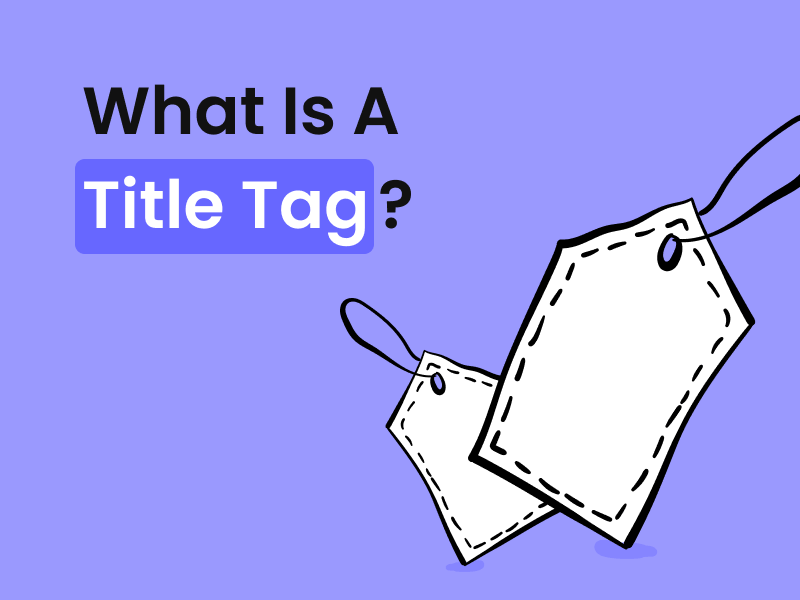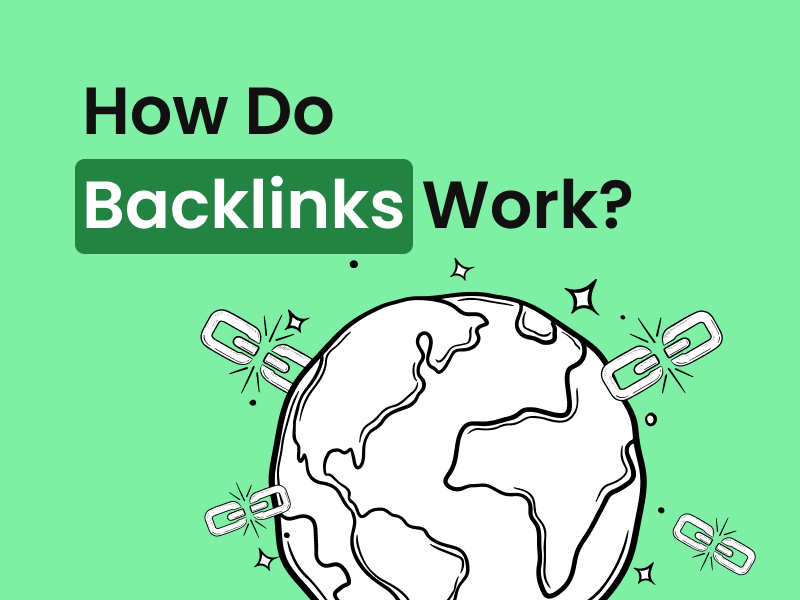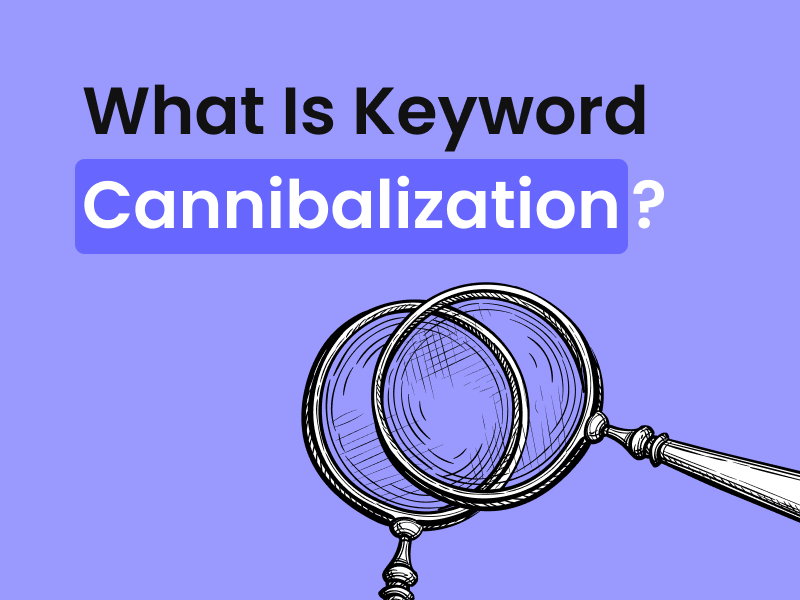What is Local SEO and How Does it Work? A Comprehensive Guide to Local Search in 2024
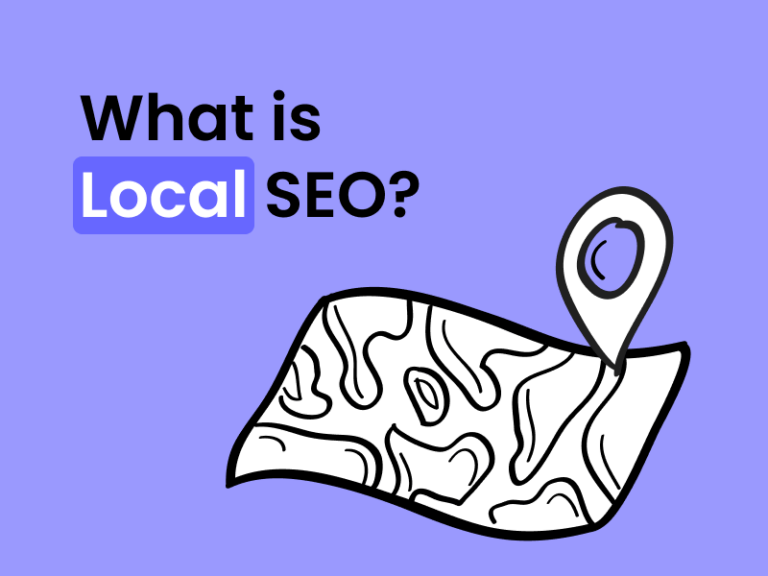
By Melissa Ng | Last Updated 5 January 2024
Introduction to Local SEO
What is Local SEO?
Local SEO is the practice of optimising a website to enhance its visibility in local search results. It’s an integral part of effective SEO solutions, typically involving a thorough SEO audit and targeted SEO keyword research. Essentially a localised strategy empowers businesses to communicate with customers in their immediate geographical region. This form of search engine optimisation speaks to factors like proximity and searchers’ location-based intent. With the aid of an SEO expert and a well-planned SEO campaign, it delivers more impactful search engine results page (SERP) listings, ensuring local search matter is handled effectively.

Why is Local SEO important?
The significance of Local SEO is hard to overstate. It offers an efficient avenue for businesses to market their products or services to local customers in the digital space. When customers search for businesses near them, an effective Local SEO strategy ensures your company appears as one of the top results, bridging the gap between the online world and your physical location.
Here are a few compelling statistics highlighting the importance of Local SEO:
- “Near me” searches have increased by more than 500% in recent years [1], reflecting the growing trend of users looking for local businesses.
- Mobile searches for phrases like “open near me now” have seen a 200% increase [1].
- Roughly 30% of all mobile searches relate to location [2].
- Google states that 76% of people who conduct a location-related search on their mobile visit a local business within a day [3]. Additionally, 28% of these searches result in a purchase [3].
In essence, Local SEO is crucial because you risk leaving money on the table if your business is not visible in local searches. Many people are ready to take action when they perform local searches, and your job is to be there when they do.
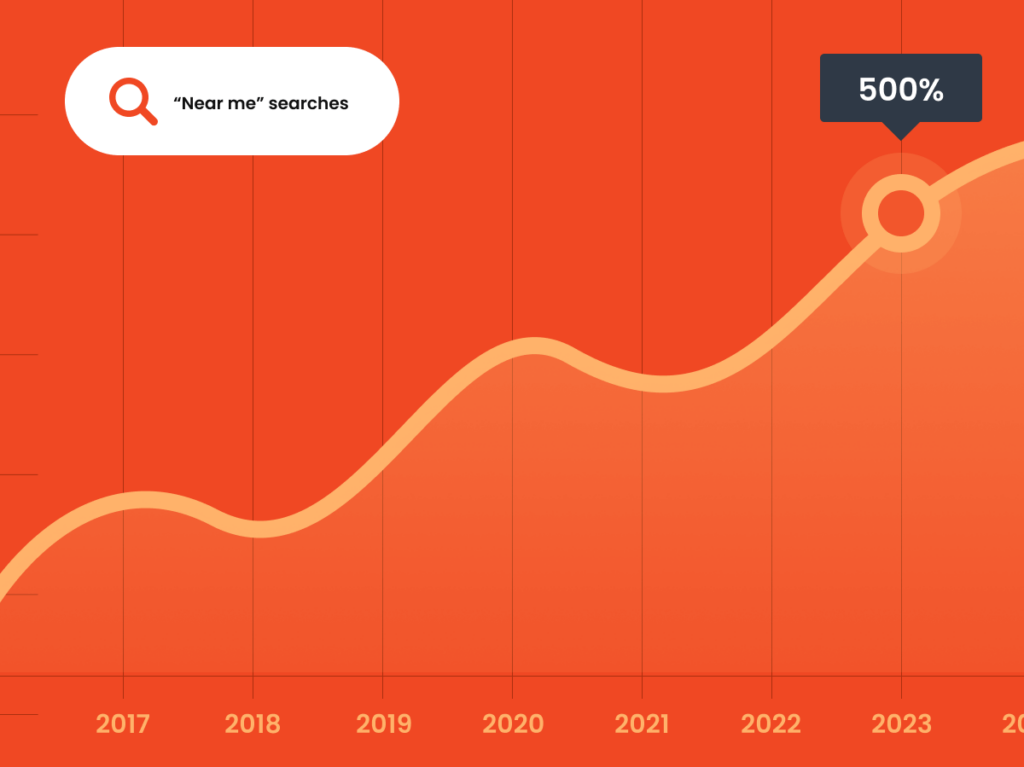
Understanding the Fundamentals of Local SEO
The Role of Social Media in Local SEO
Social media can be a potent tool in your Local SEO arsenal. Engaging with your audience on platforms such as Facebook, Linkedin, and X (formerly known as Twitter) can tremendously heighten your brand’s visibility within local search results.
Social media plays an indispensable role in Local SEO strategy for a few reasons:
- Uniform NAP (Name, Address, Phone Number): The information on your social media pages and business data across all platforms should precisely match your website and local listing NAP. Consistent NAP presentation, the key factor in citation opportunities, across all channels can significantly improve your search engine rankings.
- Customer Reviews and Ratings: Encouraging customers to provide reviews and ratings on your social media profiles can improve your local search visibility. Positive reviews boost reputation and attract more local customers.
- Social Sharing and Local Engagement: By producing share-worthy, location-based content and encouraging local customers to check-in, you enhance your local engagement which can boost your brand awareness and visibility. The more engagement, the more Google considers your brand as trusted and relevant to local searchers.
To sum up, social media significantly aids your Local SEO efforts by helping your business maintain consistency and create an omnipresent online signature, making it easily discoverable and attractive to local customers.
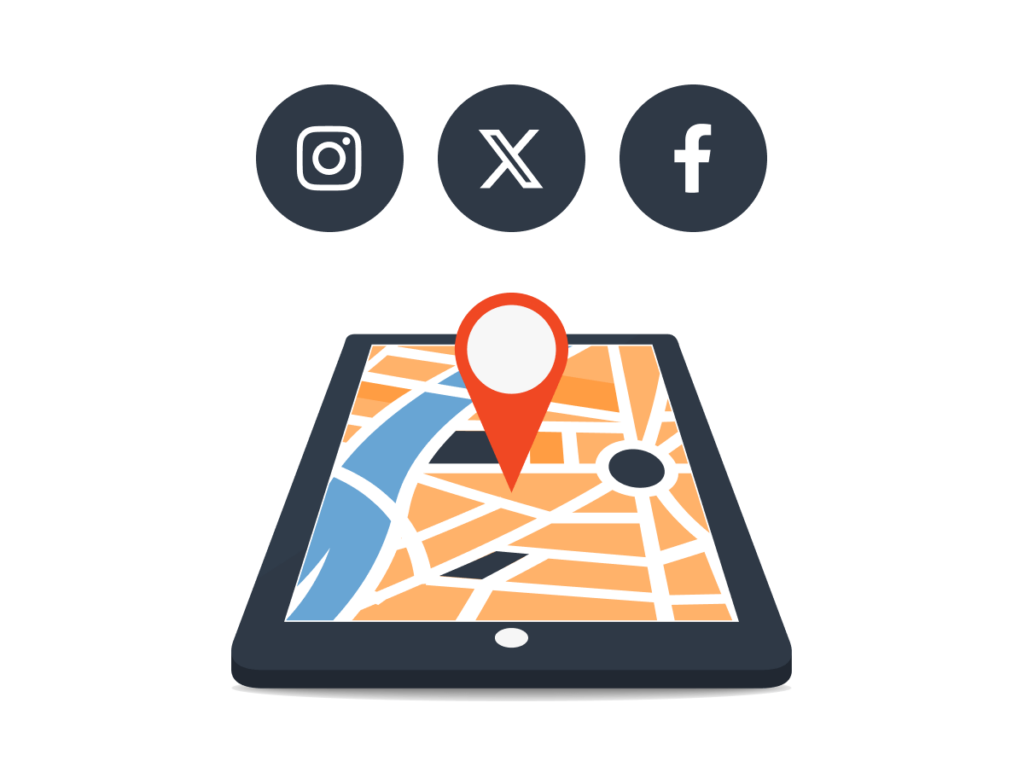
How Search Engines Like Google Determine Local Ranking
When determining local ranking, Google considers three main aspects: Relevance, Prominence, and Distance. To understand how Google works, remember it utilises a slightly distinct algorithm from the standard Google search, emphasising more on geographical factors. Now, let’s delve into each aspect in depth.
- Relevance: Google Maps ranking is crucially affected by the relevancy of a business profile to a searcher’s query. Therefore, ensure your Google Business Profile (formerly known as Google My Business (GMB)) is accurate, exhaustive, and up-to-date, permitting Google to perceive your business as a suitable search result.
- Distance: Google uses data from map data aggregators to calculate the proximity of your business to the searcher’s location. This crucial factor in your local SEO ranking leverages local search as a potent tool for driving foot traffic and online visitors to your website.
- Prominence: Prominence reflects your business’s reputation. Google aggregates data from across the web, like links, articles, and directories, using tools such as Google Search Console to determine this. Online reviews and ratings also contribute, where a high Google Maps star rating boosts your prominence. It’s crucial to note the number of reviews and ratings also plays a part.
In addition to these, Google also considers unique local SEO ranking factors like NAP citations, keywords used in your Business Profile listing, sentiment of online reviews, the number of “check-ins” at that location, shares on social media, and the presence of a verified Business Profile listing.
By comprehending these aspects and utilising tools like an SEO rank tracker and Google Analytics, you pave the way for optimising your business to appeal to Google’s local search algorithm more effectively, thereby reaching more potential customers in your vicinity.
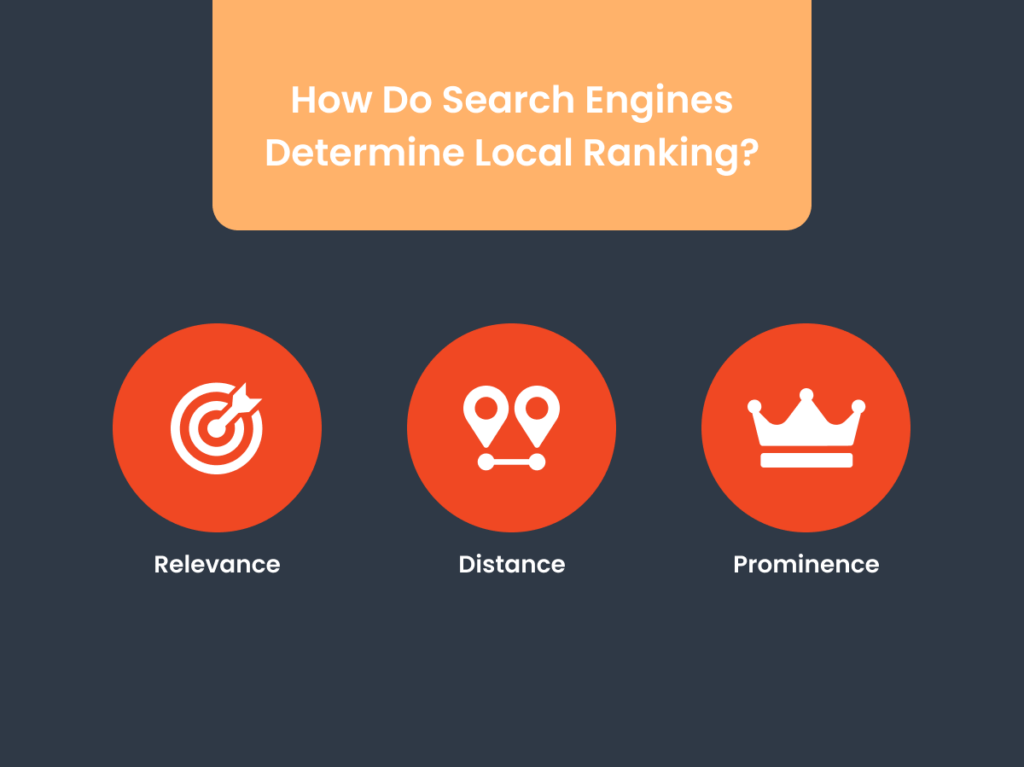
Optimising for Local SEO
Engaging on Social Media and Adding Posts to Google Business Profile
Social media engagement is more than just gaining likes, comments, and shares. The process not only helps businesses connect with their audience and build relationships but also optimises the company’s Local SEO by improving its ranking on the dashboard of popular search apps. By delivering a consistent flow of share-worthy content, say a new blog post perhaps, businesses increase their visibility and extend their outreach to potential local customers.
Furthermore, Google Business Profile acts as a vital local business listing platform, allowing businesses to post updates directly to Google search and its rankings map. This feature is indispensable for sharing business updates, events, offers, and more, thus representing the company directly to local searchers. To optimise your Business Profile posts, bear these key points in mind:
- Add Media: Incorporating compelling images or videos can significantly enhance your post engagement.
- Use Call-to-Actions: Motivate users to take some form of action, such as booking appointments, signing up, buying, learning more, etc.
- Post Regularly: Cultivate the habit of maintaining a blog and other forms of engaging posts regularly to keep your audience updated about the business. The frequency and recency of posts often improve your local dashboard ranking.
- Respond To Comments: Creating engaging interactions on your posts not only enhances your brand reputation but also encourages more engagement.
When utilised proficiently, social media engagement, and Google Business Profile posts — acting as the business’s apps — can be potent tools that significantly amplify your local SEO efforts.
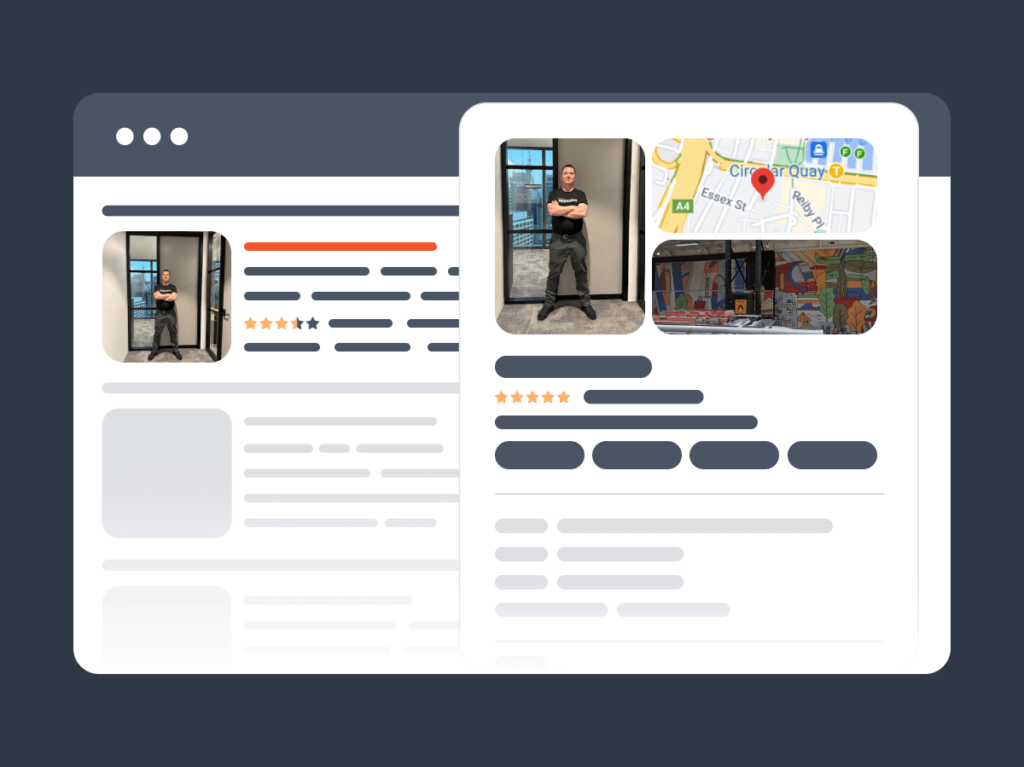
Using Location-Focused Keywords Effectively
Keyword optimisation is indisputably one of the most important aspects of SEO, and it becomes even more impactful when we talk about local SEO. Being strategic about the keywords you use, or putting in place a solid keyword strategy, can exponentially amplify your reach in local searches.
- Long-tail Local Keywords: Using long-tail local keywords, uncovered during scrupulous SEO keyword research, can significantly upgrade your local SEO efforts. Due to their specificity, these keywords tend to generate higher-quality traffic, meaning the people who find your site are more likely to use your service. For instance, rather than using “pizza restaurant,” consider using “neapolitan pizza restaurant in North Sydney.”
- Keyword Research: Mapping out a clear keyword analysis helps to understand what your local customers are searching for. Tools like the Semrush, Ahrefs or Google’s Keyword Planner can improve your keyword research by helping you identify popular local keywords relevant to your business.
- Strategic Placement: Once you have successfully completed your keyword strategy, make sure to insert them strategically throughout your website, blogs, and other marketing content. Key areas include meta descriptions, headers, URL slugs, content body, image alt text, and subtitles.
Ultimately, effective keyword usage is about relevance. By optimising your site with location-focused keywords that local customers are searching for, you can significantly drive more traffic to your site and improve your local search rankings.
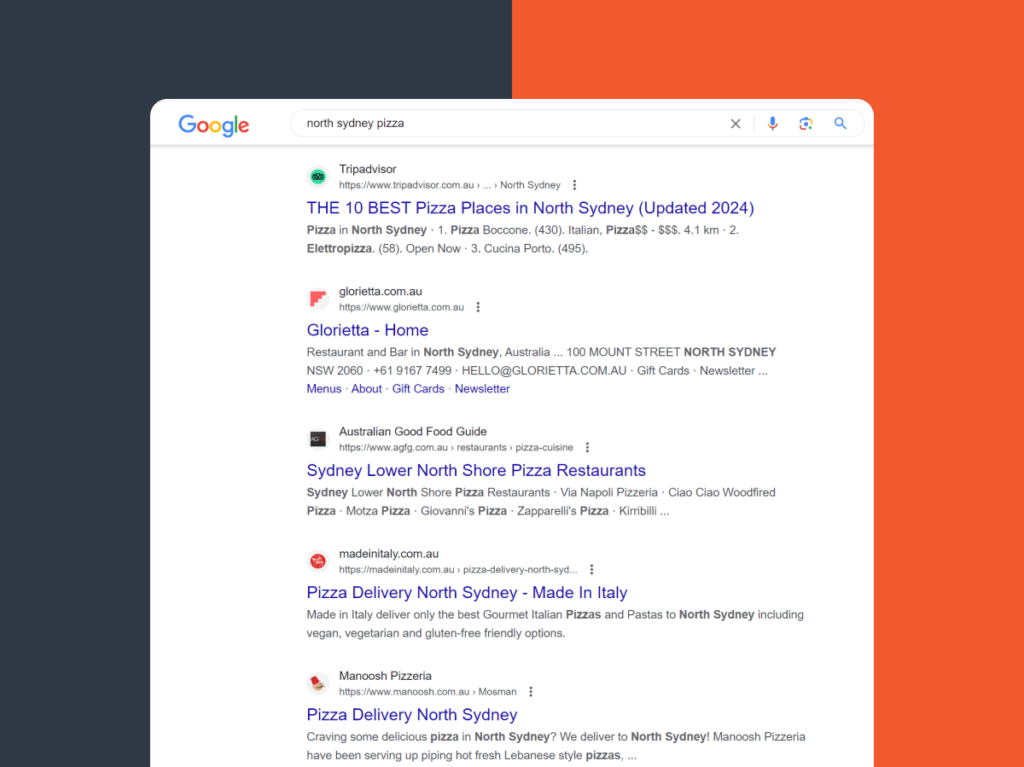
Refining Your On-page Local SEO Strategies
Leveraging Location Pages and Unique Content for Each
When trying to maximise Local SEO, location-specific landing pages and unique content are invaluable assets. In this effort, utilising a tool such as BrightLocal, built specifically for local business marketing, can prove crucial as it offers comprehensive SEO solutions even for a pizza place in your neighborhood. A pizzeria, for instance, might be just one among many, but a quality storefront and relevant storefront photos with a streamlined promotion via its location pages can set it apart.
Location Pages: These are standalone webpages crafted to rank highly for location-specific searches. They provide essential business details such as name, address, phone number, store hours, unique store descriptions, promotions, parking or transit information, and testimonials from customers. If your business, like a bustling pizza place, has multiple brick-and-mortar locations, create location pages for each one.
Unique Content: To avoid the pitfall of your pages competing against each other in SERPs, each location page should house unique content. This could include interesting tidbits about your establishment that would interest the local community, for example. Populate your location pages with locally relevant content that is useful, informative, and completely unique to each specific location.
Take the case of a roofing service, which, without being physically present in Bondi or Parramatta, ranked prominently in local SERPs by optimising around these terms – proving the power of strategic location page use.
Finally, don’t forget to add a Google Map of your location on each respective location page. Including the map not only enhances usability for your site visitors but also sends location-based signals to search engines, contributing towards your local SEO.
It’s essential to note that optimising your website for local search can help customers discover your brand effortlessly. So whether it’s a pizza place or a general store, it’s key to helping them reach you.
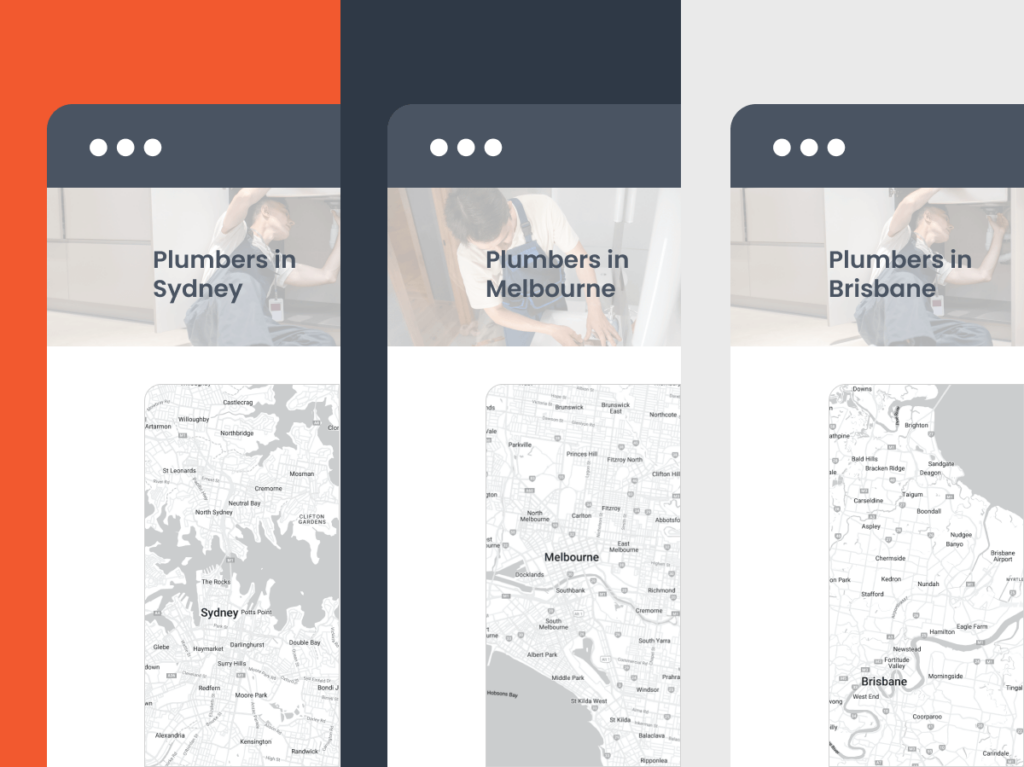
Optimising Meta Descriptions for Local Searchers
Meta descriptions play an important role in convincing searchers to click on your link in the SERPs. They are short snippets of text, typically around 160 characters, that clearly delineate a webpage’s content. It is crucial to optimise the URL and meta description for search engines using high-volume keywords.
For local SEO, effectively weaving in location-based keywords into your meta descriptions can greatly enhance your local search visibility. These keywords should ideally mirror the local language and vernacular preferred by your niche group of potential customers.
For example, if you’re a salon situated in Surry Hills, rather than drafting a meta description such as “World-class salon offering top-notch hairstyling services,” you might wish to say “Surry Hills’ finest salon delivering the freshest hair trends and styles.”
Additionally, consider integrating local promotions or unique selling propositions in your meta descriptions. The objective is to sufficiently differentiate your local business in the competitive landscape while still matching local searchers’ requirements.
Utilising persuasive copy that motivates users to click is a proven tactic to enhance your organic CTR. For instance, Google ads employ engaging terms like “save,” “free upgrade,” and “price promise.” Seamlessly incorporating similar captivating phrases into your meta descriptions can boost their clickability.
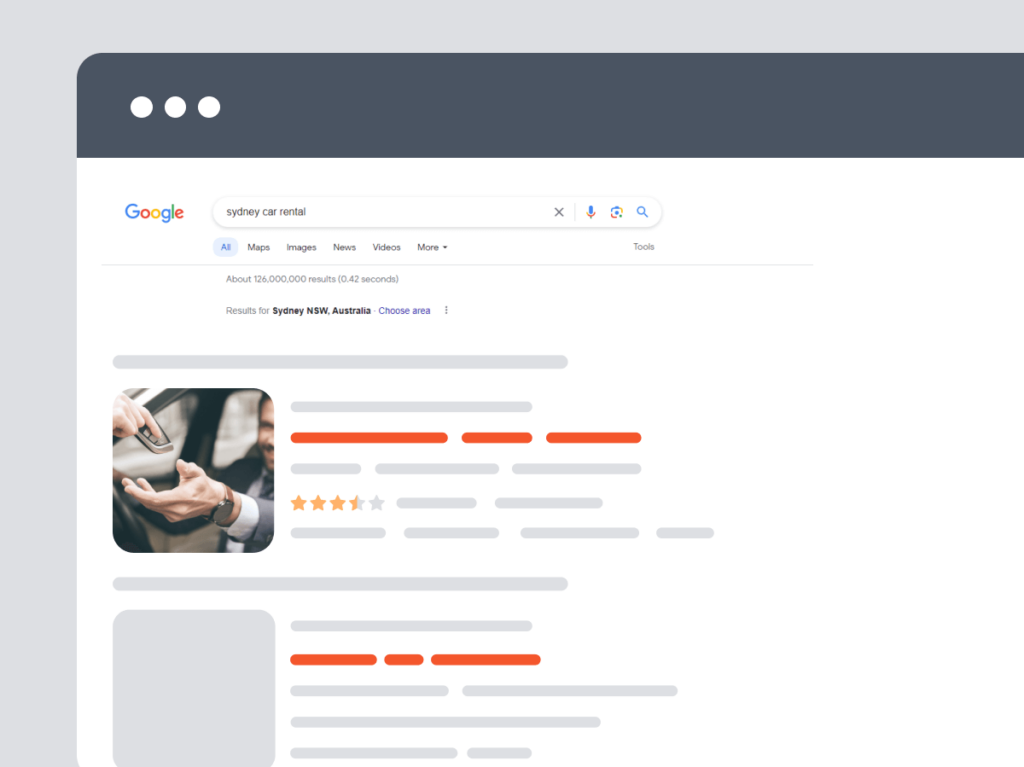
Going Beyond the Basics: Advanced Local SEO Tips
The Power of Building Local Backlinks
The importance of backlinks for every online business’s SEO strategies, in general, is well-understood. But when it comes to Local SEO, local backlinks take the spotlight. They are links from another local website to yours, and they’re seen as a vote of confidence by search engines, indicating that your site is a credible source of information. An essential element of this process is the ability of your website to be crawled and indexed effectively by search engine bots, known as “crawlers”.
The power of local backlinks lies within their ability to show search engines that you’re relevant and authoritative in your specific local area. Achieving this may involve:
- Working With Local Businesses And Bloggers: Establishing authentic relationships with businesses in your locale can get you featured or mentioned on their websites or blogs. Apart from the local SEO boost, this helps to showcase your business to wider audience.
- Starting a Blog Covering Local Issues: Not only will this position your business as a local expert, but it can also attract backlinks back to your site, as other local businesses may reference your content.
- Getting Listed In Local Roundups Or Guides: Being listed in your city’s best-of guide or local round-up article not only gets your business in front of more local eyes, but it can also result in a high-quality local backlink. Don’t forget to audit these listings regularly to ensure accuracy which matters for your local SEO.
- Building Citations: Citations matter because they help surface local businesses in online search, and encourage trust in these listings. The NAP of your establishment should be crawlable HTML text on your site, enabling it be displayed prominently in location-based search results. Every time your NAP is listed in a reputable business directory, you earn a citation.
It’s crucial and an important stat to remember that backlinks should always come from relevant and authoritative websites. In the same vein, local link building must also prioritise quality over quantity.

Encouraging Online Reviews and Managing Reputation
Online reviews and reputation management are two of the most vital aspects of a successful Local SEO strategy, and the two often interrelate.
Online Reviews: Encouraging your customers to leave reviews on popular platforms like Google Business Profile, Yelp, or Facebook can considerably impact local search rankings, consumer trust, and click-through rates. Leveraging local volume metrics in a tool like Keyword Overview can help identify areas of improvement in these platforms. Businesses should pursue a high volume of positive reviews. Moreover, the metrics show that consumers tend to view businesses that respond to reviews promptly and professionally more favourably.
Search engines account for this behaviour in their ranking algorithms due to the increased trust and authenticity that reviews add. Metrics reveal positive reviews can lead to increased traffic and conversions, while negative ones (if left unaddressed) can harm your business’s online reputation.
Reputation Management: This involves molding public perception of your business by influencing online information. Its metrics prove that managing your online reputation effectively includes monitoring mentions of your business, responding to inquiries and criticisms promptly, and using strict measures to mitigate negative SEO. A robust online reputation presents you as a trustworthy and reliable business, as shown by metrics.
To obtain more reviews, you can:
- Ask customers personally after a successful transaction.
- Use email or text message campaigns to request reviews.
- Offer incentives like discounts or freebies to motivate customers.
- Add review links on your website and social media outlets.
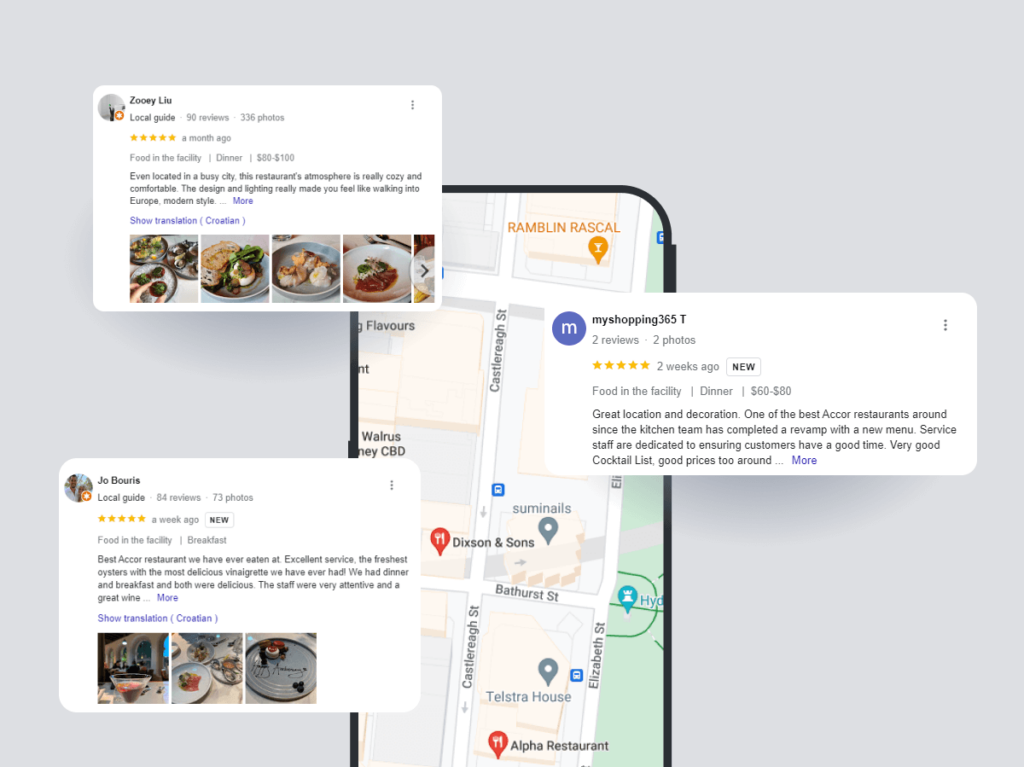
Mobile Optimisation and its Impact on Local SEO
Importance of a Mobile-friendly Website for Local Search
As the world grows increasingly mobile, it’s essential for businesses to ensure that their websites deliver a seamless mobile experience. On top of that, each page of your website should include thoughtful SEO optimisation, such as having a relevant title tag. A mobile-friendly website is not just a recommended best practice – it’s a necessity for Local SEO. Here are several reasons why:
- User Experience: A large percentage of online browsing now happens on mobile devices. Therefore, ensuring a high-quality, seamless mobile experience is critical to keeping users engaged and reducing bounce rates.
- Local Searches: According to Google, 30% of mobile searches are done to find local content [2], and these searchers often have high buying intent. Having a mobile-friendly site is more likely to convert these high-intent visitors into customers.
- Search Rankings: Google uses mobile-first indexing, which means it predominantly uses the mobile version of the content for indexing and ranking. A website, not optimising its title tags will struggle to rank well in search results, significantly affecting your Local SEO efforts.
- “Near Me” Searches: “Near Me” searches have dramatically increased over the years, and most are performed on mobile devices. A mobile-friendly site is necessary to attract and serve these local searchers.

The Rise of Local Voice Searches
Voice search technology, while steadily gaining popularity over the past few years, has seen a remarkable surge recently. Today, 20% of all mobile searches are voice searches according to data from Google [4], and Bing is catching up. This rise in voice-activated searches has ushered in a new era in Local SEO, with the emphasis on Google and Bing’s role increasingly significant.
The shift to voice search is particularly compelling in the local context. 58% of consumers use voice assistants to locate a local business in the last 12 months [5]. Humans naturally use more conversational language for voice searches, posing queries as full sentences or questions rather than fragmented keyword phrases typically used in bing or text-based searches.
For instance, instead of typing “best coffee shops near me,” a user might voice search “Hey Siri, where’s the best coffee shop around here?” or “Hey, Bing, find the best coffee shop nearby.”
To optimise for local voice search, consider these tips:
- Use Conversational Keywords: As voice search queries often sound more conversational, consider using long-tail keywords that are phrased in a natural, conversational manner.
- Adopt a Question-Answer Format: Many voice searches are question-based. Therefore, framing your content in a question-answer format enables search engines to better match your content with voice-search queries.
- Optimise for “Near Me” Searches: Voice search users often use phrases like “near me” or “close by.” Utilise schema markup to make your local content more accessible for these searches.
- Improve Local SEO Fundamentals: Fulfilling the fundamentals of local SEO, such as a fully-fledged Google Business Profile, consistent NAP information across directories like Apple Maps, Yelp, Bing Places, and Facebook, positive customer reviews, and locally-focused content remains crucial in this context.
Read our blog post to learn more: How to Optimise for Voice Search: Tips On How To Rank Higher In Google’s Voice Search Results

FAQ- Local SEO Queries Answered
How long does it take to learn local SEO?
The time it takes to learn local SEO largely depends on the individual’s prior knowledge of SEO, their learning speed, and the time they can dedicate to study. For example, when launching a bathroom remodeling business, learning the fundamentals of local SEO can take anywhere from a few days to a couple of weeks. It begins with understanding the basics of SEO, followed by diving deeper into local SEO specific topics such as Google Business Profile, NAP citations, local backlinks, local-focused keywords like “bathroom remodeling,” and online reviews.
However, bear in mind that learning local SEO is not a one-time process. Just like keeping up with the latest trends in bathroom remodeling, it requires ongoing education as search engine algorithms change and digital trends evolve. By constantly educating oneself and keeping pace with industry developments, one can truly become accustomed to the ins and outs of local SEO.
How does local search marketing differ from regular SEO?
Local search marketing, while similar to regular SEO in its aim to improve visibility in search engines, has several key differences rooted in its geographical focus. Indeed, why local search matters cannot be overstated.
- Target Audience Perspective: Local SEO targets searchers within a specific localisation, meeting the needs of users keenly searching for certain products or services near them. On the flip side, regular SEO, focuses more broadly on keywords, casting its net to a wider, often international audience.
- Algorithm Factors: For local SEO, geographical factors such as proximity and local reputation weigh heavily. Conversely, regular SEO is more concerned with factors like keyword relevance and domain authority.
- Local Search Listings: The importance of local SEO is critical to businesses aiming to rank in local search listings, specifically the ‘Local Pack’ or ‘3-Pack’ that dominates above organic search results for location-based queries. In contrast, traditional SEO prioritises primarily on improving a website’s organic search rankings.
- Google Business Profile: A fully optimised Google Business Profile is a cornerstone of a successful local SEO strategy. Interestingly, this aspect is far less essential for businesses focusing solely on regular SEO.
- Reviews: Online reviews are pivotal in local SEO, influencing both the business’s local search ranking and its reputation. Meanwhile, for regular SEO, while beneficial, reviews are not as imperative.
Given these differences, it’s essential for businesses to tailor their strategies depending on their focus: local search marketing or traditional SEO this ensures efficient reach to the target audiences.
Sources
[1] Think With Google: https://www.thinkwithgoogle.com/marketing-strategies/app-and-mobile/near-me-searches/
[2] Think With Google: https://www.thinkwithgoogle.com/consumer-insights/consumer-trends/mobile-statistics-for-location-searches/
[3] Think With Google: https://www.thinkwithgoogle.com/consumer-insights/consumer-trends/local-search-conversion-statistics/
[4] Think With Google: https://www.thinkwithgoogle.com/marketing-strategies/app-and-mobile/voice-search-statistics/
[5] SCORE: https://www.score.org/resource/infographic/infographic-voice-search-101-small-businesses
Disclaimer
Some of the links in this post are affiliate links. This means if you click on the link and purchase the service, we may receive an affiliate commission at no extra cost to you. Rest assured, we only recommend products we believe will add value to our readers.
Submit An App
Seen a cool app you think we should review? Submit your recommendation using our form.
